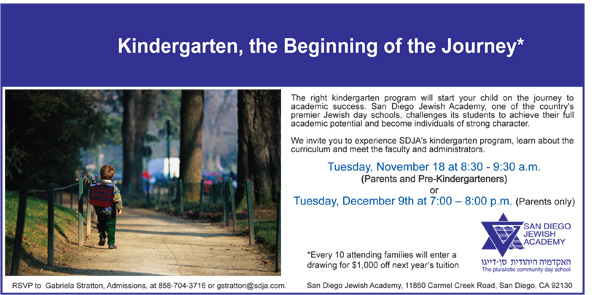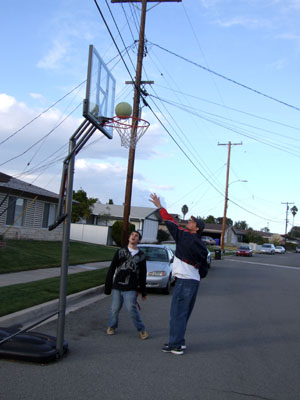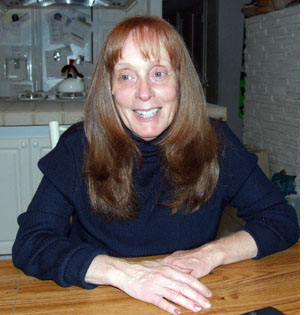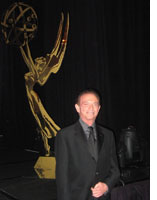| |
|





THE JEWISH CITIZEN
Former 'Little' Pal now a mentor himself
By Donald H. Harrison
 SAN DIEGO -- Austin Miller is not such a "Little Pal" anymore to Andrew Rappaport. He's turning 18, is a senior at La Jolla High School, and with his 4.2 grade-point average, he is in the process of applying to colleges throughout the country. In fact, as of next month, he will be too old for the Jewish Family Service's Big Pal/ Little Pal program—at least until someday in the future when he decides perhaps to become a Big Pal himself. SAN DIEGO -- Austin Miller is not such a "Little Pal" anymore to Andrew Rappaport. He's turning 18, is a senior at La Jolla High School, and with his 4.2 grade-point average, he is in the process of applying to colleges throughout the country. In fact, as of next month, he will be too old for the Jewish Family Service's Big Pal/ Little Pal program—at least until someday in the future when he decides perhaps to become a Big Pal himself.
Donald H. Harrison
It is not all that unlikely that Miller will decide after college to mentor someone the way that Rappaport had mentored him. Last summer, he served as a counselor at Camp Ramah in Ojai, a job that required him to take responsibility with two other counselors for a bunkhouse full of campers who were all within the same age bracket that he was—11 to 12—the year that his father died.
Miller recalled that when he got together for the first time with his 13 campers, he wanted them to know—as Rappaport had let him know more than three years ago—that "I can tell them what is up, and give them good information, but also show them that I am interested in having a good time and am not just a serious guy. I can have fun too."
Both Rappaport and Miller previously had unsuccessful mentor/ mentee relationships before they were introduced through JFS. Rappaport, 36,a counselor for County Mental Health Services, said the mother of the first boy he was assigned to had trouble keeping their appointments, thus creating tension. Miller's two previous mentors were assigned to him via non-JFS programs on a short-term basis. Neither of them were with Miller long enough to build the necessary level of trust not only with him, but also with his family, which includes a mother and two older sisters.
 When Rappaport first came to Miller's door, the ice needed to be broken. They went outside to shoot some hoops, and asked each other before and after the exercise about each other's interests and families. As much as Miller wanted a Big Pal—and his mother Terry wanted him to have a male figure in his life—so too did Rappaport want to have a "brother" in his life. Raised as an only child, he said he always wanted to have that sense of family. When Rappaport first came to Miller's door, the ice needed to be broken. They went outside to shoot some hoops, and asked each other before and after the exercise about each other's interests and families. As much as Miller wanted a Big Pal—and his mother Terry wanted him to have a male figure in his life—so too did Rappaport want to have a "brother" in his life. Raised as an only child, he said he always wanted to have that sense of family.
Common interests in sports and music were building blocks for the relationship, the two said during an interview. They got together a couple times a month, with activities varying from "shooting baskets to watching a ballgame on TV, to having lunch or dinner out, going to a movie, miniature golf, bowling, lasert tag," Rappaport said.
Miller plays soccer and baseball for his high school, and Rappaport played basketball and tennis back in his high school days. But as important as sports are to the two, also important was the fact that Rappaport could provide Miller with a male outlook.
For example, said Miller, back in his freshman year in high school, "I was dating this girl for maybe five months. It was my first long relationship—me and this girl were talking every night and it was intense for a freshman relationship, and we broke up. I couldn't talk to any of my school friends about it ... I called Andrew and I said, 'I don't want to be alone, but I don't want to hang out with any of my schoolfriends now' and we got together for lunch and we just talked."
Rappaport said "I've had my heart broken and I tried to let him know that this is part of normal adolescence; it is going to happen multiple times but you are going to get through it." His job as a mentor, he added, was to "understand that he was grieving his loss, his frustration, his being upset and to try to sympathize with him and let him know it was not the end of the world."
In fact, Miller had had several girlfriends since.
Rappoport said one of his favorite times in their relationship is when "Austin calls me out of the blue, not when he wants something, or is scheduling a time to meet, but just to tell me about his day, or about his weekend, or keeping me up to date on what is going on."
 They agreed that over the years, their relationship has been transformed from Big Pal/ Little Pal to that of friends. And, they anticipate that the friendship will continue for the rest of their lives. Miller's mother says when she thinks about her son's future, she imagines that Rappaport will also be there--whether it is for her son's college graduation, his marriage, his -- They agreed that over the years, their relationship has been transformed from Big Pal/ Little Pal to that of friends. And, they anticipate that the friendship will continue for the rest of their lives. Miller's mother says when she thinks about her son's future, she imagines that Rappaport will also be there--whether it is for her son's college graduation, his marriage, his --
"She's got my life all mapped out for me!" Miller chuckled. His mother blushed.
After Miller goes away to college, will Rappaport take on another Little Pal?
"A good question," Rappaport said. "I've been thinking about it." Miller suggested that if Rappaport does, then when he returns
to San Diego from college he could help Rappaport as sort of an Associate Big Pal to the LIttle Pal.
At JFS, there is concern that not enough adults are stepping forward to offer their friendship and guidance to Jewish boys and girls who are without their dads. Currently, according to Lorna Hecht-Zablow, Big Pals coordinator, "more than 15 children are on the waiting list. Male volunteers are especially needed to be matched with the high percentage of boys on the waiting list. Little Pals waiting to be matched with Big Pals include triplets being raised by their single mother, a child living with his grandmother because both parents are absent, and a brother and sister who recently emigrated from Russia with their mother. People who want more information may contact (858) 637-3090."
Rappaport said common reasons cited by prospective Big Pals for not getting involved are that they are too busy with their personal lives, or that they are reluctant to take on the responsibility. However, he said, for those who are sincere in their desire to help youngsters who need them, there is plenty of expertise and programming within the Big Pals organizaton to draw upon—especially for the younger boys.
"A big part of the program is all the Big Pals and Little Pals getting together for functions like going bowling, or having a party with music and clowns, and Chanukah parties," he said. "That is a nice chance for some of the Little Pals to meet each other, and the Big Pals also."
Miller said that if there are any youngsters who have doubts about the program, he knows from personal experience that Big Pals aren't just "nerdy old guys trying to be nice."
"I hope people will support the program, whether that means getting involved, encouraging others, or getting the word out," he said.


CRITIC AT LARGE
Cry Baby: A flashback to the 1950's
By Larry Zeiger
 LA JOLA, California—When I was in elementary school in Cleveland Heights Ohio, about the age of six or seven, I remember my father instructing me to stay away from the families of some of the kids that attended my school. His explanation to a six year old was rather simplistic. “These are dangerous times,” he would say. ”You never know who is watching you or taking pictures of you.” LA JOLA, California—When I was in elementary school in Cleveland Heights Ohio, about the age of six or seven, I remember my father instructing me to stay away from the families of some of the kids that attended my school. His explanation to a six year old was rather simplistic. “These are dangerous times,” he would say. ”You never know who is watching you or taking pictures of you.”
He then showed me the names of parents of some of my friends that were listed in the Cleveland Press and was adamant that I should not go over their homes after school. Later in my life, I discovered that the list was of people who were suspected of being Communists and/or had attended
Larry Zeiger
meetings or rallies that may have been about Communism. Of course, the word, Communism was never mentioned throughout my public school education and as a kid, most of us, unknowingly equated Communism with the Nazi Party!
Cry Baby currently at the La Jolla Playhouse is based on John Waters’ audacious satirical film which starred Johnny Depp. The film version was quite daring, outrageous, and certainly not for everyone. The musical adaptation with book by Mark O’Donnell and Thomas Meehan and songs by David Javerbaum and Adam Schlesinger is an enjoyable, often lively but somewhat “conservative” adaptation of the John Waters’ film. Oh, there are some skinny dipping scenes and some love scenes by the lake, but it's all done with complete innocence with an exuberant cast that appears to have jumped off your TV set from High School Musical.
Much of the material works here. To establish the time period (1950's, McCarthyism, censorship) the opening song illustrates that painful memory of obtaining the hideous polio shot. Sung by community kids waiting in line for the shot as well as school nurses and community leaders, “The Anti-Polio Picnic” is a humorous opening. The nicely dressed kids (remember “dress codes”) in their cool pastels and Brylcream greased-back hair are the epitome of what “good” American kids should be, but underneath the surface of this perfect community lurks a very dark and troubling tale of lies and downright cruelty.
Enter Cry Baby who sings the hilarious song, “I’m Infected,” which allegorically reveals his sense of rejection by his squeaky clean community and his tragic past (both his parents were given the electric chair during the
Blacklisting period). As a result, Cry Baby has his own circle of friends who are “bad kids.” But Cry Baby is not as bad as you might think; in fact, there is a major revelation that takes place at the end of the play which will ultimately make Cry Baby “the good guy” who has been horribly victimized by his community.
Along the way, Cry Baby falls in love with the perfect Allison. There is a sense of mystery and excitement the two experience by crossing social and economic boundaries plus they are just plain crazy for each other. But lo and behold, the relationship is doomed from the start and to make matters worse, Allison accepts a marriage proposal from Baldwin, a young man who seems so polite and so perfect on the outside but he too is harboring a dark secret. Baldwin, played by the talented Christopher Hanke, represents the supposedly perfect American society of the time period and reveals his supposed devotion to American life with the very satirical, “Thanks for the Nifty Country.”
Allison’s grandmother, Mrs. Vernon-Williams played by Harriet Harris represents the archetype of good parenting; however, like many of the principal characters she harbors secrets from the past which are “almost” revealed in the humorous song, “I Did Something Wrong. . . Once.”
In the end of the play, all the tantalizing and shocking secrets are revealed and elicit some laughter from the audience, but the situation is so dark and tragic (in reality) that the hilarious buildup to the denouement did not seem to work for me. The revelation contains such ugly events in this community that it was a bit hard to accept Cry Baby's acceptance of what really happened to his parents – and then have the cast (Cry Baby included) jump into a rousing finale of “Nothing Bad’s Ever Gonna Happen Again.”
Direction by Mark Brokaw is lively, energetic and often creative. The first half moves a bit slowly but the second half is filled with terrific choreography and more action and moves at a rapid pace until the rather convoluted resolution.
James Snyder as Cry Baby is a terrific performer but appears too perfect for the role of a social outcast. Elizabeth Stanley, who looks a bit too old for her part, performs with great skill and has some very funny ballads which she handles beautifully. An absolute showstopper is Chester Gregory II as the outrageous Dupree (think Little Richard) who can sing like nobody’s business!
The second act of the show contains one of the best dance sequences I’ve seen in theater. The sequence which begins with Dupree (Chester Greogry II) and the ensemble of guys performing “Jailyard Jubilee” is a showstopper. Clever, innovative, and energetic, the choreography by Rob Ashford in this section is one of the main reasons for seeing this show. If the entire show were this thrilling, it would be an absolute winner. With some revision more focus on character, Cry Baby will be a huge hit.



SAN DIEGO JEWISH WORLD THE WEEK IN REVIEW
MONDAY, DECEMBER 10
Donald H. Harrison in San Diego: Synagogue bids farewell to a woman who shunned the honors that inundated her
Sheila Orysiek in San Diego: City Ballet's Nutcracker sparkles
SUNDAY, DECEMBER 9
Alanna Berman in San Diego: Conference probes 'duty' of Jewish journalists toward Israel's image
Shoshana Bryen in Washington D.C.: Capability more important than 'intent' in measuring nuclear danger from Iran
Donald H. Harrison in San Diego: San Diego connections fail to rescue Shadow Soldier from fear of intimacy
Rabbi Baruch Lederman in San Diego: When all seems impossible, then persevere
Rabbi Leonard Rosenthal in San Diego: Wicked examines quesiton of 'otherness'
FRIDAY, DECEMBER 7-SATURDAY, DECEMBER 8
Shoshana Bryen in Washington D.C.: Questions abound about NIE assessment
Donald H. Harrison in San Diego: Let's stop demonizing undocumented immigrants; let's help Mexico's economy
Sheila Orysiek in San Diego: If U.S. intelligence was so wrong about Iraq, why does Left believe it about Iran? Reader Response
Michael M. Rosen in San Diego: Boling takes San Diego City Council campaign to Beth Jacob Congregation
THURSDAY, DECEMBER 6
Shoshana Bryen in Washington D.C.: NIE has 'moderate confidence' Iran has not reactivated its nuclear weapons program
Peter Garas in Canberra, Australia: Stingy? Friendly to strangers? You may be genetically predisposed to such behaviors
Irv Hackel in Brookyn, N.Y.: 'There are angels out there' at Ezer Mizion
Donald H. Harrison in San Diego: His remains sent from Poland to U.S. so he could be buried where Jews would visit
Donald H. Harrison: Chanukah at Hillel: A meshuganah auction
Ira Sharkansky in Jerusalem: Shock and disbelief in Israel over U.S. latest estimate on Iran's nuclear program
WEDNESDAY, DECEMBER 5
Garry Fabian in Melbourne, Australia:Two Jews and new friends in Parliament... Church group slammed for trip 'bias' ... Toben pulls apology, denial remains on web site ... Community welcomes Smith as new foreign minister ...
Donald H. Harrison in San Diego: Beth Am packed with Olshansky fans
Sheila Orysiek in San Diego: The differences and similarities between a dreidel and a pirouette
plus these feature photos...
Hannukiyot at Beth Am
Mideast delicacy on a license plate
< BACK TO TOP
|
|

